News from 2016-08-05 / KfW Development Bank
Carioca tramline off to a great start
KfW finances climate-friendly transport – construction work finishes right on time for the Olympics
A new tramline has been put into operation in Rio de Janeiro just ahead of the opening of the Summer Olympic Games. The line will link up Rio’s historic port in the north-west of the city with the city centre located further to the east. The route will also serve long-distance coach and ferry terminals and the Santos Dumont national airport.
Trams have now started running on the first approximately 8 kilometres of the 13.5 km line and are already carrying thousands of passengers every day. This new section added to the Brazilian metropolis’ public transport network will therefore help the city to accommodate the increase in traffic, even during the Olympics, in a climate-friendly way.
When the next stage of construction is completed at the end of September, trams will carry around 76 million passengers every year on three lines. The trams can transport around 8,400 people per hour on the busiest routes and will run every 3 to 15 minutes around the clock.
Environmentally friendly and modern
According to Werner Klinger, the responsible KfW project manager, the "VLT Carioca" tramline benefits the centre of Rio by providing it with "an environmentally friendly, modern, user-friendly and barrier-free local public transport system that complements air, ferry, rail and bus transport well." Rio’s city council says the tramline connects the port and the airport with the city centre "in a faster, safer and more sustainable way".
KfW is funding the investment on behalf of the German Federal Government with a reduced-interest loan of EUR 133 million, while the Brazilian Government and private banks are providing close to EUR 300 million in additional financing. The Rio tramline forms part of a comprehensive programme with which KfW is co-financing particularly climate-friendly investments in local public transport to the tune of EUR 265 million through BNDES, the Brazilian development bank. While these investments may well include tram systems like the one in Rio, they also include other forms of rail transport or bus lines and even cycle paths. The schemes must have a positive impact on the climate. KfW is also helping its local partners to develop and apply methods to monitor the impact that transport projects have on the climate.
Huge savings potential in the transport sector
According to the Intergovernmental Panel on Climate Change (IPCC), the transport sector is responsible for almost one quarter of global carbon dioxide emissions, and at the same time provides good opportunities to switch to sustainable systems. This is especially true of urban areas. In statistical terms, Rio’s new tramway will cut down on around 12 million car journeys per year and prevent close to 325,000 tonnes of carbon dioxide from being emitted over 25 years of use, thereby helping Brazil to meet its climate protection targets.


Share page
To share the content of this page with your network, click on one of the icons below.
Note on data protection: When you share content, your personal data is transferred to the selected network.
Data protection
Alternatively, you can also copy the short link: https://www.kfw-entwicklungsbank.de/s/enzBWrMC.BZ6A
Copy link Link copied